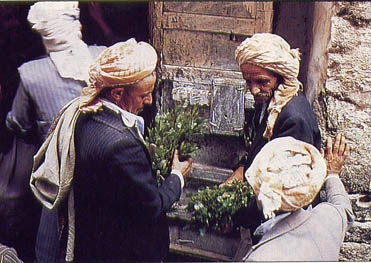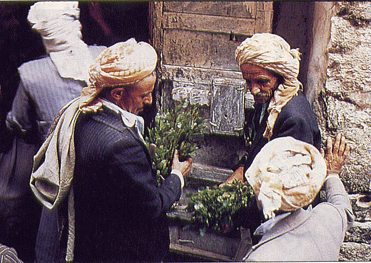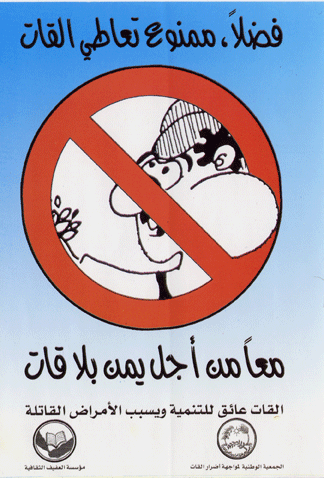
The Yemeni cartoon above says it all: “I read in a book about the harmful health effects from qat and cigarettes, so I decided, God willing, to cease reading.”

The Yemeni cartoon above says it all: “I read in a book about the harmful health effects from qat and cigarettes, so I decided, God willing, to cease reading.”

Here is a short, but informative, video in Arabic on the use of qât (Catha edulis) in Yemen, via the Arabic service of Russia Today.

Qat market in Yemen; photograph by Pascal Maréchaux
For anyone reading this in Paris, I am giving a talk in the afternoon on qat in Yemen. Here are the details:
CONFÉRENCE
Prof. Dan Martin Varisco (Anthropologie, Hofstra university)
QÄt, Sex and Traditional Healing / QÄt, sexe et médecine traditionnelle
Abstract/Résumé
There is a substantial corpus of analysis about “Catha edulis”, or qÄt in Arabic, both for Yemen and East Africa. Much of this focuses on the origin and distribution of the plant and its legality in an Islamic context. Prof. Varisco has previously published articles on both these aspects of the plant’s history. This talk will focus on the proposed medical benefits of qÄt chewing in traditional Yemeni culture, with a focus on the issue of sexual
performance and libido. Although relatively late as an introduction into the medicinal and pharmacological literature, qÄt was placed within the existing humoral system. QÄt was considered cold and dry, which explains why the recommended preparation for its use is eating a meal of ‘hot’ food like sorghum porridge or meat. Opinions differ about its impact on the libido. Prof. Varisco examine relevant historical sources (including legal
and medicinal texts), ethnographic accounts, poetry and contemporary scientific analysis of “Catha edulis” for his talk.
Un corpus est déjà constitué sur le qÄt ou Catha edulis, aussi bien pour le Yémen que pour l’Afrique de l’Est. Il porte essentiellement sur l’origine et la distribution de cette plante, ainsi que sur son caractère légal en Islam. Ces deux aspects ont déjà fait l’objet de plusieurs publications du Prof. Varisco. Dans sa conférence de Paris, il s’intéressera plutôt aux vertus médicales du qÄt, selon la culture yéménite, en particulier aux performances sexuelles et l’accroissement de la libido qu’il est considéré procurer. Bien que le qÄt ait été introduit dans la théorie médicale et pharmacologique de manière tardive, il n’en fait pas moins partie du système des humeurs. Il est classé parmi les matières froides et sèches, ce qui explique qu’il doive être absorbé avec des mets Ë‹chaudsËŠ, tel que brouet de sorgho ou viande. Cependant, les opinions varient à propos de son effet sur la libido. Pour les besoins de sa communication, le Prof. Varisco aura donc recours à des sources historiques variées, incluant les textes légaux et médicaux, à des relevés ethnographiques, à la poésie et, enfin, aux analyses scientifiques contemporaines de « Catha edulis ».
La conférence se tiendra le 10 mars 2011 entre 15h et 17h, à l’Institut National d’Histoire de l’Art (INHA), en salle Vasary, Paris, France

Selling qât in Sanaa, Yemen’s capital. Photo: Bryan Denton
These days if you run across an article on Yemen, it will no doubt feature a scenario of gun-toting tribesmen swearing allegiance to Al-Qaeda, the latest German tourist hijackings or feigned shock at the terrible, terrible addictive drug called qât. At least this was the case in Sunday’s New York Times in another piece of mixed journalistic pablum by roving reporter Robert Worth. Entitling the article “Thirsty Plant Dries Out Yemen,”, the author seems unaware that the site of his posting (Jahiliya) is in fact the Arabic term for the time of “Ignorance” before the rise of Islam. I doubt this reporter stepped out of a Queen-of-Sheba-era time machine and interviewed Abraha about his recent defeat at the “Battle of the Elephant” before Mecca. So where exactly is the fabled posting site of Jahiliya? Ironically, it is part of a World Bank irrigation project. I will leave the irony about IMF money being poured into Jahiliya in the strict sense to the imagination of the reader. And I strongly suspect the posting was made from a fancy hotel in the capital Sanaa and not from a rural internet cafe, while sipping qishr. But for a front page article on a major newspaper, ignorance is no excuse. Continue reading Ignorance is no Excuse

Selling qât in Yemen. Photo by Pascal Maréchaux
Much has been written, pro and con, about the chewing of qât leaves in Yemen. In addition to the economic and social problems over qat, there is a historical puzzle. When and how did the plant Catha edulis come from Ethiopia, its botanical origin, to Yemen? Yemeni legend and folkore suggest that the stimulant qualities of qat leaves were first discovered by a goatherd who noticed the effect on goats who browsed on the plant. A variant of this goat legend, told to me in 1979 by a poet from Husn al-‘Arus, suggests that an Ethiopian came along to explain to the goatherd what was happening. The goat is one of the few animals that can be seen occasionally eating qât leaves, but the story is surely apocryphal. Sometimes it is told for the origin of coffee, another stimulant brought from East Africa. Continue reading Tracing the History of Qat

Yemeni farmers threaten to swap grapes for qat
Saddam Al-Ashmori, The Yemen Times, October 11, 2008
SANA’A, Oct 11 – Yemeni raisin producers have threatened to replace grapes with qat in their plantations after the loss they sustained this year as a result of not being able to sell all their produce.
Nasser Al-Khawlani, owner of a vineyard, said that the reason behind the low demand for local raisins this year was the presence of other cheap and attractive raisins in the markets, smuggled into Yemen from China.
He further said that, if the government didn’t take steps to prevent the smuggling of Chinese raisins into the country, farmers would replace grapes with qat in their lands. Continue reading Yes, We Qat no Grapes

U.S. Embassy to Qat Chewers: quit now if you want an immigrant visa
By Sarah Wolff, Yemen Times,
SANA’A, March 31 — The United States Embassy in Yemen recently introduced a new provision for Yemenis seeking permanent residence in the U.S. Its message? Lay off your qat if you want to live in America.
Under this new stipulation, the U.S. Embassy will not issue immigration visas to anyone who is addicted to qat. Unites States law defines an “addict” as anyone who has used a drug for other than experimental purposes, i.e., more than one-time usage. This means that anyone in Yemen who has chewed qat more than once will have to medically prove that they are no longer using it in order to live in the United States.
U.S. law qualifies qat as a Schedule I controlled substance because it contains the chemical cathinone, which is a narcotic with addictive properties and has no known medicinal benefits. Abuse of Schedule I drugs is considered a “Class A” medical ineligibility under the Immigration and Nationality Act. Continue reading The Qat ate your visa

One of the unique aspects of living in Yemen is chewing qat, the tender young leaves of the shrub Catha edulis. In the late afternoon Yemenis often get together with their supply of qat, a water-pipe (narghila) and plastic bottles of spring water. Much has written about the plant and its use. For starters, check out the Qatalog on Yemen Webdate.
Youtube now brings you rap versions by Yemeni artists. Chew on this or this for awhile.